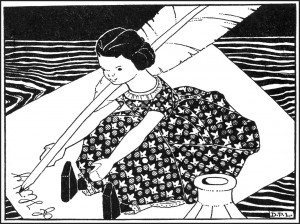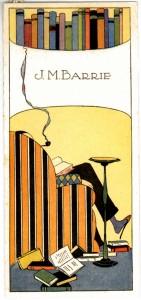 It wasn’t until I started at the second mystery bookshop, that I learned how important a signed book is. The first store I worked in, Foul Play, although delightful, was small and predominately paperbacks. An author signing his or her book, never occurred to me. Not until a local author dropped by and asked if there were any of his books I wanted him to sign. I had no idea who he was. I was operating on my reading consumption circa Dell Mapbacks and 70s authors–books I found at library sales. I had not investigated the last 10 years or so of new suspects.
It wasn’t until I started at the second mystery bookshop, that I learned how important a signed book is. The first store I worked in, Foul Play, although delightful, was small and predominately paperbacks. An author signing his or her book, never occurred to me. Not until a local author dropped by and asked if there were any of his books I wanted him to sign. I had no idea who he was. I was operating on my reading consumption circa Dell Mapbacks and 70s authors–books I found at library sales. I had not investigated the last 10 years or so of new suspects.
Foul Play was located in the heart of The Village, New York City. Another branch resided on the Upper West Side. When Lawrence Block came into the store, I politely asked his name, and pulled down tons of his titles–he seemed to have written a billion. It wasn’t until I saw a certain book, that I understood his importance-at least to me. He had finished a manuscript begun by Cornell Woolrich, my hero. And he had written it really really well. I would have been better off, however, if I’d not learned of his stature in the field because I became nervous every time he stopped in. Only two other author signing instances occurred while I managed Foul Play. A new author asked to sign the one hardcover of her title we had, and an original paperback writer scribbled her name within a pile of her latest release. Each of these drop-ins were author instigated. I had nothing to do with bringing them in.
The next bookshop was an entirely different experience. Part of my managerial tasks was lining up as many crime fiction authors possible, and have them do a drop-in signing. If it were anywhere but midtown Manhattan, it could have been called a drive by signing, without gang violence, one hopes. I was completely green in this area, but determined to have more authors sign their new books than ever experienced in the store, ha.
A drop-in signing consists of the manager contacting the publicist (or if on a personal basis, the author themselves). Say, Michael Connelly had a new book out and because of the store’s signed book club and other customers who loved Michael we needed 100 books autographed. I’d check with the publicist for dates of his tour, if and when he would be in NYC for formal signings at B&N, etc., and I’d set up a day and time. And Michael would quietly arrive, come upstairs, and I’d start bringing the books, stack by stack, for him to sign.
Extremely important–do not under any circumstance force the author to open and find the title page to sign, himself. It takes time and it’s rude. As soon as the books arrived, myself and others would unpack and open each book to the *title page*. The full title page has the name of the book, with the author’s name below, and the publisher’s name name and city. On the back of the page the copyright is listed. This is also essential, when setting up each book to open to the exact page needed, check to be sure the books you have are first editions. If not a first, doesn’t matter if it’s signed a billion times, it’s value, if there turns out to be any, is moot. Figuring out a first edition can be tricky, some publishers leave the words ‘first edition’ on even though it in it’s 18th printing. It must be a first edition, first printing for it to be of value. Once the edition is checked, the dust jacket is opened and folded in at the title page, making it impossible to open at any other point in the book.
I used to move damn fast for each signing. I’d bring a huge stack of books to a large desk, set them down next to the desk, and open each book, slide it over to the author, the author would slide it onto the left side of the desk, and I’d swing over to the signed books, stack them close by quickly while I scurried back for the next pile. This process was repeated quickly and efficiently, with pauses only for those book club members who wished an inscription.
desk, set them down next to the desk, and open each book, slide it over to the author, the author would slide it onto the left side of the desk, and I’d swing over to the signed books, stack them close by quickly while I scurried back for the next pile. This process was repeated quickly and efficiently, with pauses only for those book club members who wished an inscription.
An inscription used to be the preferred way to gain a signed book, it was personalized, friend to friend, it seemed. But as time changed and every one who bought a book wanted it signed, the inscription fell out of favor–because if the inscribed person decided to unload it, who wants to buy a book that says, : ‘To Aunt Ida, with sincere best wishes for your bunion to clear up. Yours truly, Dennis Lehane”.
Some buyers still did, and would ask for a specific saying. If the author was into doing it, fine, if not, they got the standard, : To Cousin Fritz, With Sincere Best Wishes, Janet Evanovich.” The customer got what the author wanted to give. Some authors had to sign so many books with each new release, it was impossible to inscribe any, at any store. Dick Francis was a case in point. He suffered horrific arthritis in his hands, from years of being a jockey. He would still sign, being a gentleman, but rarely would he inscribe–only to friends and special requests from a few booksellers.
So, as the author is bent over page and pen, I’m running back and forth, if no one is helping, taking signed books back to where they need to be, and bringing forth those yet to be signed.
Occasionally the superlative owner’s assistant would supply M&M’s or something along those lines, but most of the drop-ins were quick casual affairs. In, out. I made each author feel at home and as important as possible, if signing but 5 books or 500. After all, they are the people who really put bread on our plates, and I for one had and have great respect for their talent.
 Very very big names in the field did not sign at my desk, oh no. They split a bottle of wine and chat with the owner in his private library. I still carried the stacks of prepped titles, slipped them in and out re-stacking while discussion reverberated around the room. Who were the big names back in the mid 90s? Robert Parker, Ed McBain, Dick Francis, P. D. James, Donald Westlake, James Ellroy, Elmore Leonard. Notice–almost exclusively men. The big names were invariably pals of the owner, excluding Dame James. And most were perfect gentlemen, wonderfully nice and accommodating. A very few were chauvinisticly inclined.
Very very big names in the field did not sign at my desk, oh no. They split a bottle of wine and chat with the owner in his private library. I still carried the stacks of prepped titles, slipped them in and out re-stacking while discussion reverberated around the room. Who were the big names back in the mid 90s? Robert Parker, Ed McBain, Dick Francis, P. D. James, Donald Westlake, James Ellroy, Elmore Leonard. Notice–almost exclusively men. The big names were invariably pals of the owner, excluding Dame James. And most were perfect gentlemen, wonderfully nice and accommodating. A very few were chauvinisticly inclined.
So why only drop-ins? No formal events? At that time it was due to sheer numbers-way too many authors would be signing for them to have big hullabaloos. And since we had solid customer base, the worry about whether signed books would sell without serving wine and cookies to the writer’s friends and family was slight.
One problem–the rare writer who ignored the ‘informal’ part of drop-in informal signing, and dragged every 5th cousin and slight aquaintance into my working area, making it impossible for me to do my job–both dealing with the books to be signed, or anything else I on my agenda, because my work station was clogged up with a vain author and loud partying pals. I was so furious at one signing that became a fiasco like this, I almost lost my cool. I did lose my cheer leader enthusiasm and became very stiff and cold, and obviously ticked off the writer every time I told her and her friends they needed to leave. She became sarcastic and nasty and dragged her time in the store to sign maybe 20 books that normally would have taken 15 to 20 minutes top, to 1 entire hour of torture. Her publicist saw the lay of the land early on and fled the building to wait a safe distance from me.
One last oddity of this particular bookstore; paperbacks were not signed-and I don’t mean reprints that should’nt be signed anyway, but first edition original paperbacks. The way Jim Thompson once was published. And are now extremely collectible. The owner at that time considered original paperbacks non books, He almost refused to acknowledge they existed. I sneaked Lisa Scottoline up for a quick drop-in for her first Edgar nominated book. We sold plenty, and who knows what the paperback may be worth now–I know how valuable mine is–priceless, because I feel instrumental, how ever little, in helping the now best seller get a hold in the market and be able to continue to grow to fame. And that’s worth the running around and obnoxious few who never had a clue that we as booksellers were doing them a huge favor by asking them in to simply sign so their books may sell that much quicker and better.
PS I have loads of signing stories I may impart at some point, plus some cool personal inscriptions.

Diana, I adore signed books, and loved reading your post. Looking forward to reading more of your signing stories. Here’s my favourite signing story, and it’s Australian …. kind of.
http://www.theage.com.au/news/national/celebrity-author-surprises-darwin-bookseller/2007/08/16/1186857658440.html
Judy–that’s a fantastic story! At some point I’ll about the time I met him, and was mortified. Thanks for the compliment!
Not a comment, really (although I enjoyed the humor in your observations!), but I am wondering if you ever had the opportunity to meet my favorite modern author, Mr. Nelson DeMille?
Hello! Yes, a couple of times. A very lovely gentleman from what I remember. No airs, no ego, just came in, and pleasantly signed the books necessary. I enjoyed his visits. Thanks for reading the article!